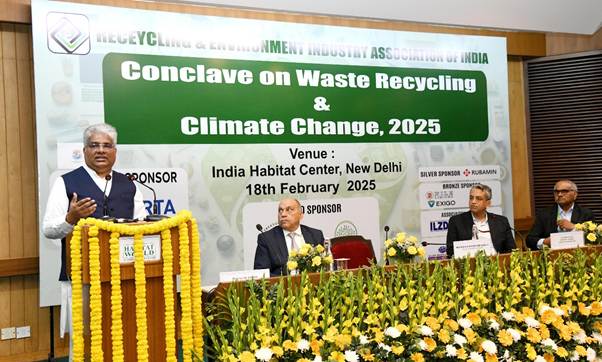Four Key Strategies for a Successful Circular Economy highlighted – Redesigning Products for Circularity; Investment in Advanced Recycling Technologies; Strengthening Supply Chain Collaboration; Consumer Awareness and Behavioral Change
New Delhi|HL
Union Minister for Environment, Forest and Climate Change, Shri Bhupender Yadav today inaugurated a day-long conclave organized by the Recycling and Environment Industry Association of India (REIAI), on ‘Waste Recycling & Climate Change 2025’.
Addressing the inaugural session, the Union Minister stated, “India generates around 62 million tonnes of waste annually, with plastic, electronic, and hazardous waste growing rapidly. The traditional linear economic model of take, make, and dispose is no longer sustainable. The increasing pressure on landfills, depletion of natural resources, and environmental damage from unchecked waste disposal require urgent action. The circular economy is not just an alternative; it is essential. It marks a fundamental shift in how we produce, consume, and manage materials”. A well-functioning circular economy not only conserves natural resources but also fosters industrial innovation, economic competitiveness, and job creation, he stated.
Waste treated as Resource:
Minister stated that under the visionary leadership of Prime Minister Shri Narendra Modi, India is shifting from waste management to harnessing the economic potential of recycling through waste to wealth initiative. “The circular economy has a major role in the future including reducing, reusing, and recycling at every stage, from product design to end-of-life management. Waste should not be treated as a burden but as a resource. Adopting sustainable practices is crucial for achieving economic resilience, environmental sustainability, and social security”, he added.
The Minister further stated that by the year 2050 India’s circular economy is expected to have a market value of $2 trillion and create 10 million jobs. It a big opportunity for start-ups and new recycled product developers. It is important to align this growth with environmental sustainability, drawing inspiration from nature’s efficient recycling systems as nobody recycles like Nature, he added.

Economic Benefits:
Minister Yadav urged the recycling industry in the country to develop and adopt newer innovative technologies for reducing dependence on natural resources as well as cutting down imports of critical minerals needed for economic growth. “Adopting circular economy principles can bring tremendous economic benefits. This shift towards resource efficiency aligns seamlessly with our national vision of Atmanirbhar Bharat, enhancing the competitiveness of Indian industries in global markets”, the Minister added.
The Minister informed that the Ministry has been instrumental in formulating policies and regulations, including Extended Producer Responsibility (EPR) frameworks, that incentivize recyclers and integrate the informal sector into formal recycling systems. These initiatives aim to streamline waste management and promote eco-friendly production across industries. The Ministry has notified a number of market-based Extended Producer Responsibility (EPR) Regulations, including those on e-waste, end-of-life vehicles, plastic packaging, waste tyres, waste batteries, used oil. The revenue earned by registered recyclers from sale of EPR certificates is additional profit earned over and above the profit generated from the sale of recycled product, he added.
Yadav said that the government has laid down the policies but Industry-wide adoption of circular approaches is critical to driving sustainable growth and resource efficiency.
4 key strategies for sustainability:
- Redesigning Products for Circularity: Companies must move beyond single-use models and design products for recyclability. The integration of biodegradable, reusable, and modular components will help extend product life cycles and reduce waste.
- Investment in Advanced Recycling Technologies: Adoption of emerging technologies can transform waste management systems, thereby improving recovery rates.
- Strengthening Supply Chain Collaboration: Businesses need to collaborate across the value chain to optimize resource utilization, create closed-loop production systems, and build markets for secondary raw materials.
- Consumer Awareness and Behavioural Change: Circularity requires active consumer participation. Industries must invest in campaigns to engage consumers, incentivize recycling, and promote sustainable consumption behaviours.
Dr Amandeep Garg, Additional Secretary, Ministry of Environment, Forest and Climate Change and Chairman, Central Pollution Control Board (CPCB) said, “There is a huge gap and huge potential to work towards waste recycling system, as the role of recycling industry is important cut imports of various critical products needed for economic growth”. Corporate houses should lead the transition to a circular economy by incorporating recyclable designs, promoting sustainability in dealership operations, and enhancing consumer awareness, he added.
The event witnessed the presence of Dr. Ashok Kumar, President, Recycling and Environment Industry Association of India and subject experts from the industry and about 200 delegates environmental scientists, waste management professionals and policymakers.










